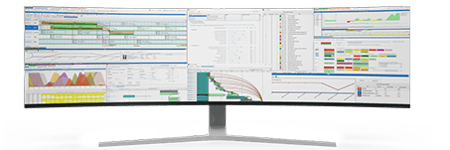Optimizing for Performance: The Impact of Logistics on Costs and Productivity
Supply chain logistics isn’t just a support function—it’s a strategic driver for performance. From production scheduling to delivery, logistics can significantly influence costs and productivity, impacting everything from product availability to regulatory compliance.
For Supply Chain Managers, optimizing logistics becomes crucial, especially when leveraging advanced planning tools like PlanetTogether integrated with ERP giants such as SAP, Oracle, Microsoft, Kinaxis, or Aveva.
Let’s look into how an optimized logistics approach benefits medical manufacturing facilities, driving down costs, enhancing productivity, and supporting operational excellence.

Logistics in Medical Manufacturing
Medical manufacturing relies on highly regulated processes to ensure safety, compliance, and quality. Every logistical decision, whether in procurement, warehousing, or distribution, can affect these critical areas. The role of logistics in this sector encompasses a variety of processes, including:
Procurement and Supplier Management: Ensuring raw materials meet quality standards and are delivered on time.
Inventory Management: Balancing the need for availability with the cost implications of excess stock.
Transportation and Distribution: Meeting delivery timelines with minimal delay to prevent disruptions in healthcare settings.
Compliance Management: Adhering to regulatory standards for handling, storing, and transporting sensitive materials.
The impact of logistics decisions on performance metrics is clear—inefficient logistics can increase costs, delay production, and strain productivity. Conversely, strategic logistics optimization can elevate the entire supply chain.

Cost Implications of Inefficient Logistics
Logistics inefficiencies directly affect costs in several ways:
Excess Inventory and Holding Costs: In a high-stakes industry like medical manufacturing, too much inventory translates to elevated holding costs, often without added value. Poor visibility into supply needs leads to excess or emergency stock purchases, both costly.
Transportation Costs and Delays: Emergency shipments or transport delays inflate costs. Additionally, compliance with regulatory requirements for medical goods, which might include temperature control and tracking, compounds transportation expenses if not strategically managed.
Quality Control Issues: Any logistics disruption could lead to a lapse in quality, resulting in costly recalls or quality checks. Maintaining control over logistics processes ensures that quality standards are upheld, reducing the chances of costly errors.
Wastage and Obsolescence: Perishability and obsolescence are unique challenges in medical manufacturing, where materials often have a defined shelf life. Poor logistics planning can lead to waste through expired or obsolete stock, hitting both costs and productivity.

Productivity Hurdles Linked to Logistics
An optimized logistics process goes beyond cost savings; it’s essential for enhancing productivity. When logistics processes are inefficient, production teams spend valuable time troubleshooting disruptions rather than focusing on output. Here’s how logistics optimization impacts productivity:
Improved Production Scheduling: With precise logistics, production can proceed without stoppages or delays, ensuring equipment utilization is maximized. An integrated solution like PlanetTogether, when combined with an ERP like SAP, allows real-time adjustments to production schedules based on logistics data, thus reducing idle time.
Enhanced Workforce Utilization: Logistics disruptions lead to reactive planning, where employees must continuously adjust to changing timelines. Streamlined logistics processes help stabilize workflows, enabling teams to work more efficiently.
Minimized Downtime: Reliable logistics operations ensure that materials arrive on time and in optimal condition, minimizing the risk of downtime due to material shortages or quality issues. This continuity is vital in a sector where delays can have far-reaching implications.
Data-Driven Decision Making: An advanced logistics system integrated with ERP platforms supports data-driven decision-making by offering real-time visibility across the supply chain. This enables quick responses to potential disruptions and optimizes productivity.
![]()

PlanetTogether and ERP Integration: Elevating Logistics Optimization
For supply chain managers, the integration of a production planning tool like PlanetTogether with ERP systems such as SAP, Oracle, or Microsoft can significantly impact logistics performance. This integration enhances visibility, promotes collaborative planning, and enables more informed decision-making.
How PlanetTogether Integration Enhances Logistics
Unified Data Access: The integration of PlanetTogether with ERP platforms offers a consolidated view of logistics, inventory, and production data. Supply chain managers gain visibility across all logistical touchpoints, from inventory status to supplier shipments.
Predictive Analytics and Demand Forecasting: With PlanetTogether’s analytical capabilities combined with SAP or Oracle’s powerful data processing, supply chain managers can predict demand fluctuations, optimizing inventory levels and reducing waste. This predictive capacity means less overstocking and reduced holding costs.
Dynamic Scheduling and Real-Time Adjustments: Integrated with Microsoft or Kinaxis, PlanetTogether can dynamically adjust schedules based on real-time logistics data, helping to accommodate transportation delays or supply shortages. This minimizes downtime and allows production teams to adapt swiftly.
Compliance and Quality Tracking: Integrating PlanetTogether with Aveva, a leader in industry-specific compliance software, strengthens adherence to regulatory requirements. Logistics processes are more transparent, and deviations in quality or compliance are flagged early, preventing costly mishaps.
Enhanced Supplier Collaboration: An integrated platform facilitates seamless communication with suppliers. PlanetTogether, when synchronized with ERP systems, provides real-time status updates, ensuring suppliers are aware of inventory needs. This proactive approach reduces the likelihood of last-minute adjustments and emergency shipments, lowering costs and ensuring smooth production flows.

Key Metrics for Logistics Optimization
To ensure logistics processes are truly optimized, supply chain managers should monitor a few essential metrics. PlanetTogether’s integration with ERP platforms can make tracking these metrics straightforward and insightful:
Order Fulfillment Lead Time: This metric captures the time from order placement to fulfillment. Optimized logistics reduce lead times, allowing supply chain managers to keep production on track and avoid delays.
Inventory Turnover Rate: Measuring how frequently inventory is used and replenished reveals potential inefficiencies. PlanetTogether’s demand forecasting and ERP’s inventory data ensure that turnover rates align with demand, minimizing excess stock.
On-Time Delivery Rate: Tracking on-time delivery rates helps gauge logistics performance, particularly transportation reliability. A lower rate signals a need to reassess transportation providers or improve scheduling accuracy.
Logistics Cost per Unit: By calculating total logistics costs as a percentage of the unit cost, supply chain managers gain insight into overall logistics efficiency. Integrating logistics data within the ERP framework highlights specific areas where costs can be reduced.
Supplier Lead Time Variance: Variance in supplier lead times affects production schedules. Monitoring this metric helps identify suppliers with consistent delays, allowing for proactive solutions such as renegotiating terms or seeking alternative vendors.
Benefits of Logistics Optimization in Medical Manufacturing
By optimizing logistics, medical manufacturing facilities can realize several significant benefits:
Cost Savings: As transportation, warehousing, and inventory costs decrease, overall operational costs drop. Logistics optimization enables a leaner, more cost-effective approach to the supply chain.
Quality Assurance: Streamlined logistics processes mean products are less likely to experience handling errors, improving quality assurance and reducing the risk of recalls.
Enhanced Compliance: A tightly controlled logistics process facilitates better compliance with medical industry regulations, ensuring safe and effective product delivery.
Operational Agility: With improved visibility and flexibility, supply chain managers can adjust production schedules to meet demand fluctuations, manage unexpected disruptions, and maintain continuous production.
Stronger Supplier Relationships: Efficient logistics enhances collaboration with suppliers, fostering a more reliable and productive partnership.
Optimizing logistics is a vital strategy for medical manufacturing facilities aiming to control costs, enhance productivity, and meet regulatory demands. Through the integration of PlanetTogether with robust ERP systems like SAP, Oracle, Microsoft, Kinaxis, or Aveva, supply chain managers gain the tools and insights needed to drive logistical efficiency. The result? Lower costs, higher productivity, and a resilient supply chain capable of meeting the unique demands of the medical manufacturing industry.
Are you ready to take your manufacturing operations to the next level? Contact us today to learn more about how PlanetTogether can help you achieve your goals and drive success in your industry.
Topics: PlanetTogether Software, Integrating PlanetTogether, Enhanced Supplier Collaboration, Medical Manufacturing, Dynamic Scheduling and Real-Time Adjustments, Unified Data Access, Predictive Analytics and Demand Forecasting, Compliance and Quality Tracking, Lower Costs




















LEAVE A COMMENT